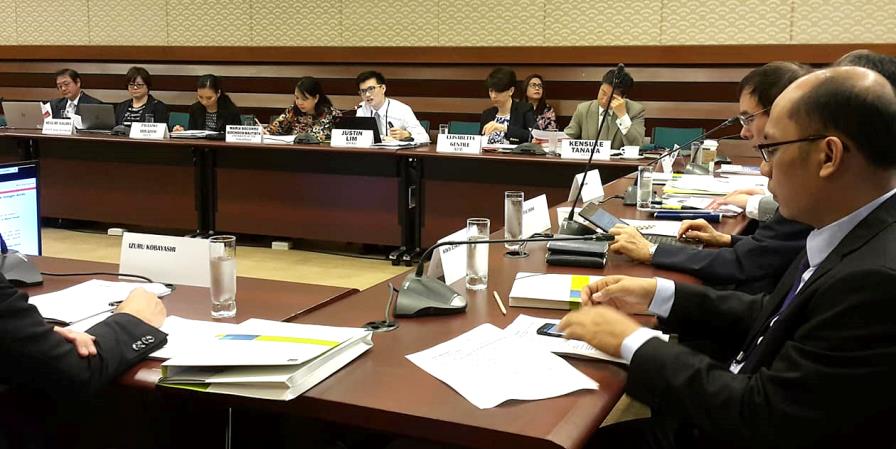Events
6th OECD-AMRO-ADB/ADBI-ERIA Asian Regional Roundtable on Macroeconomic and Structural Policies
6th OECD-AMRO-ADB/ADBI-ERIA Asian Regional Roundtable on Macroeconomic and Structural Policies
Thursday & Friday, July 26 & 27, 2018
Contact: enquiry@amro-asia.org
The OECD-AMRO-ADB/ADBI-ERIA Asian Regional Roundtable convenes leading experts from Asian countries and the Organisation for Economic Co-operation and Development (OECD) to discuss the issues at the fore of recent economic developments in the region. It serves as a platform for knowledge sharing between the OECD, the ASEAN+3 Macroeconomic Research Office (AMRO), the Asian Development Bank (ADB)/ ADB Institute (ADBI), Economic Research Institute for ASEAN and East Asia (ERIA) and Emerging Asia’s policy makers, as well as academics and the private sector. The roundtable also provides opportunities for dialogue on near-term macroeconomic policies and medium-term growth and development challenges including the linkages between near-term and medium-term issues, current agendas as well as future challenges in Emerging Asian economies.
Through five sessions, this year’s roundtable will address recent domestic, regional and global trends that are changing the environment facing Emerging Asia’s policy makers. In the first session, a case study of Singapore will be presented to look into the relationship between technology and labour markets, as well as the policy lessons of this experience for other countries. The second session will address the wave of global unbundling associated with economic digitalisation and its implications for growth in Emerging Asia. The possibilities created by technological change and the need for policy responses that also address its other consequences for workers and societies will be the topic of the third session. On the second day, the fourth session will discuss the potential for financial technology (fintech) to facilitate financial inclusion and related issues that need to be addressed. The final session will explore some of the challenges associated with Emerging Asia’s rapid urbanisation – particularly those regarding transportation and environmental hazards – and possible policy solutions.
Previous roundtables were held in Singapore, Manila and Tokyo and focused on topics including Euro-area economic uncertainty and its implications for Asian economies, new growth models in Asia, the impact of monetary easing in the OECD on the Asian economies, and the middle-income trap.
Program
Speakers
Yasuyuki Sawada
Chief Economist and Director General, Economic Research and Regional Cooperation Department, Asian Development Bank

Yasuyuki Sawada
Chief Economist and Director General, Economic Research and Regional Cooperation Department, Asian Development Bank
Justin Lim
Researcher, ASEAN+3 Macroeconomic Research Office (AMRO)

Justin Lim
Researcher, ASEAN+3 Macroeconomic Research Office (AMRO)
Kensuke Tanaka
Head of Asia Desk, OECD Development Centre

Kensuke Tanaka
Head of Asia Desk, OECD Development Centre
Elisabetta Gentile
Economist, Economic Research and Regional Cooperation Department, ADB

Elisabetta Gentile
Economist, Economic Research and Regional Cooperation Department, ADB
Fukunari Kimura
Chief Economist, Economic Research Institute for ASEAN and East Asia (ERIA) and Professor, Faculty of Economics, Keio University, “‘Unbundlings’ and Development Strategies in Asia”

Fukunari Kimura
Chief Economist, Economic Research Institute for ASEAN and East Asia (ERIA) and Professor, Faculty of Economics, Keio University, “‘Unbundlings’ and Development Strategies in Asia”
Denis Hew
Director, Policy Support Unit (PSU), APEC Secretariat, Singapore

Denis Hew
Director, Policy Support Unit (PSU), APEC Secretariat, Singapore
Lurong Chen
Economist, Economic Research Institute for ASEAN and East Asia (ERIA)

Lurong Chen
Economist, Economic Research Institute for ASEAN and East Asia (ERIA)
Joseph E. Zveglich, Jr
Director, Macroeconomics Research Division, ADB

Joseph E. Zveglich, Jr
Director, Macroeconomics Research Division, ADB
Rana Hasan
Director, Development Economics and Indicators Division, ADB

Rana Hasan
Director, Development Economics and Indicators Division, ADB
Khalid Hassan
Director, ILO Country Office for the Philippines

Khalid Hassan
Director, ILO Country Office for the Philippines
Jose Ramon Albert
Senior Research Fellow, Philippine Institute for Development Studies

Jose Ramon Albert
Senior Research Fellow, Philippine Institute for Development Studies
Naoyuki Yoshino
Dean and CEO, ADBI, Development of financial technology and financial education for widening financial inclusion

Naoyuki Yoshino
Dean and CEO, ADBI, Development of financial technology and financial education for widening financial inclusion
Satoshi Kuwahara
President, Credit Risk Database (CRD), Big data analysis of SME and its credit rating

Satoshi Kuwahara
President, Credit Risk Database (CRD), Big data analysis of SME and its credit rating
Fujio Nakatsuka
Financial Technology Institute of Japan, Development of Fin-Tech regulations

Fujio Nakatsuka
Financial Technology Institute of Japan, Development of Fin-Tech regulations
Kensuke Tanaka
Head of Asia Desk, OECD Development Centre

Kensuke Tanaka
Head of Asia Desk, OECD Development Centre
Siti Maimunah
Head of Technology Development and Research Supporting Intermodal Transport Research Center, Indonesian Ministry of Transportation

Siti Maimunah
Head of Technology Development and Research Supporting Intermodal Transport Research Center, Indonesian Ministry of Transportation
Dahlia Rosly
Advisor, Council of Advisors, Malaysian Institute of Planners

Dahlia Rosly
Advisor, Council of Advisors, Malaysian Institute of Planners
Termsap Taelakul
Spatial Development Expert, Spatial Development Planning and Strategy Office, Office of the National Economic and Social Development Board (NESDB) Thailand

Termsap Taelakul
Spatial Development Expert, Spatial Development Planning and Strategy Office, Office of the National Economic and Social Development Board (NESDB) Thailand
Shom Teoh
Programme Manager, Sustainable Cities Institute for Global Environmental Strategies (IGES)

Shom Teoh
Programme Manager, Sustainable Cities Institute for Global Environmental Strategies (IGES)
Lurong Chen
Economist, Economic Research Institute for ASEAN and East Asia (ERIA)

Lurong Chen
Economist, Economic Research Institute for ASEAN and East Asia (ERIA)
Izuru Kobayashi
COO and Director General, ERIA (next year’s host)

Izuru Kobayashi
COO and Director General, ERIA (next year’s host)
Photos

